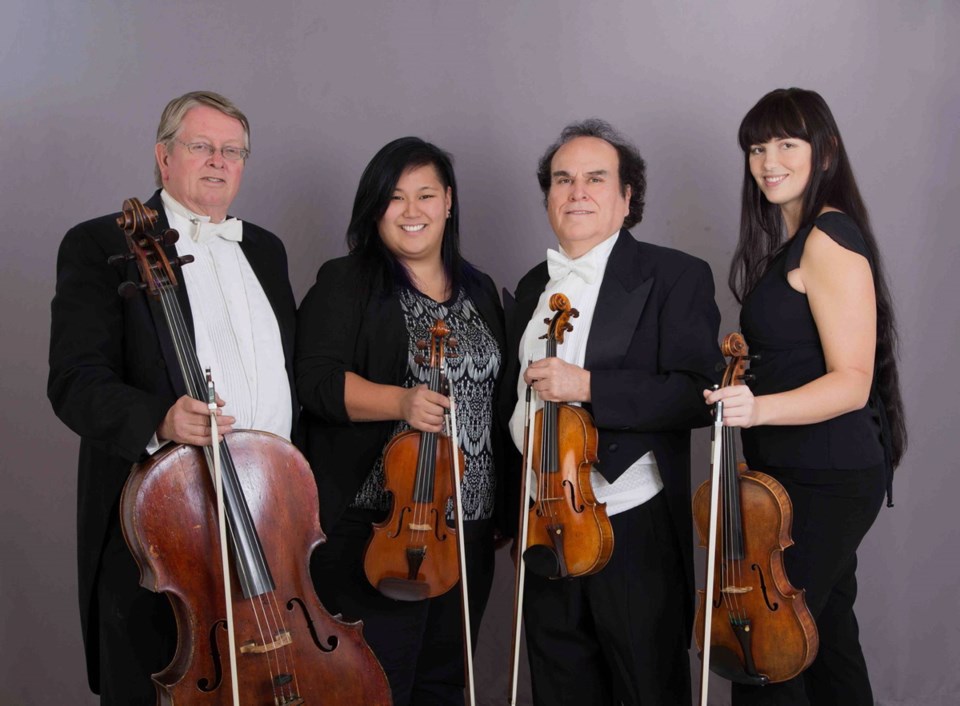The end of the regular classical-music season is nigh for three accomplished, but very different, string ensembles.
On Saturday, the DieMahler String Quartet, with soprano Betty Waynne Allison and mezzo-soprano Julia Morgan, will offer a Latin-Spanish program by composers including Joaquin Turina (Church of St. Mary the Virgin, 2:30 p.m., $25/$22.50, students by donation; diemahlerenterprises.com).
The ensemble, which is celebrating its fifth anniversary, is led by violinist Pablo Diemecke, who served for two decades as the Victoria Symphony’s concertmaster and now tours widely as a soloist. Last month, at the historic Teatro Colón in Buenos Aires, Argentina, he gave a critically lauded performance of Alberto Ginastera’s difficult and forbidding Violin Concerto, in a program celebrating Ginastera’s centenary.
(The DieMahler has one more concert this season, on June 25.)
On Saturday, May 28, to close its 10th-anniversary season, the Emily Carr String Quartet will offer another of its special Music Inside Out programs, this one devoted to Debussy’s lone string quartet (refreshments 10:30 a.m., discussion-performance 11 a.m., Baumann Centre for Pacific Opera Victoria, $25, students free; emilycarrstringquartet.com).
The ECSQ opened its season in September with a similar program devoted to Ravel’s quartet, so closing with the Debussy is apt, as the two works form a natural pair. They are often programmed and recorded together, and they both complement and contrast with each other, in ways that reveal much about the two composers.
Debussy’s String Quartet in G Minor, Op. 10, composed in 1893, belongs to his very small but distinctive and delectable body of chamber music based on Classical models. Running about 25 minutes, it has four movements that suggest a Classical cycle-a scherzo and slow movement flanked by fast movements — though the musical idiom is too revolutionary to be called “Classical” except in the loosest sense.
Before being performed, the quartet will be discussed in the context of Debussy’s life and work by the American-born musicologist Joseph Salem, who joined the University of Victoria’s School of Music as an assistant professor last year.
The 16th season of the Galiano Ensemble, the fine local string orchestra, will close on Wednesday, June 1, with a program conducted by its founder and director, Yariv Aloni (8 p.m., Phillip T. Young Recital Hall, $33/$30; galiano.ca).
The ensemble often unifies programs along national lines, and such is the case with two of its three concerts this season. The first, in September, was an all-Scandinavian affair, while the June 1 concert will be devoted to Russian composers.
The program includes the deeply expressive Andante funebre movement from Tchaikovsky’s String Quartet No. 3 in E-flat Minor, Op. 30, in a string-orchestra version by Alexander Glazunov, one of the most important Russian musicians of the generation following Tchaikovsky’s.
(Others have made arrangements of this striking movement; Tchaikovsky himself arranged it for violin and piano.)
The program culminates in a work of homage, the String Quartet No. 2 in A Minor, Op. 35, by another famous member of that later generation of Russian musicians, Anton Arensky, who, as a young man in Moscow, benefited from Tchaikovsky’s close friendship, advice and championship. This sombre work was composed in 1894, the year after Tchaikovsky’s death, and is dedicated to his memory.
It is best known for its long central slow movement, a set of variations on based on Tchaikovsky’s famous song Legend, and Arensky’s own string-orchestra arrangement of this movement, Variations on a Theme of Tchaikovsky, Op. 35a, is one of few pieces of his to have found a place in the standard repertoire.
The Galiano, however, will perform the whole three-movement quartet, in a string-orchestra arrangement published in Germany in 2003.
The concert will open with the four-movement Sinfonietta in A Minor, Op. 68, by the Russian composer Nikolai Myaskovsky. Though this work was completed in 1946, its idiom is unapologetically Romantic; the spirit of Tchaikovsky seems to hang over it. It is undeniably appealing, though it can be difficult to hear such music as innocuous when one remembers the appalling circumstances in which artists worked in the Soviet Union under Stalin.



